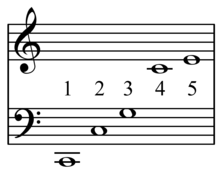Harmonic scale


The Harmonic scale is a "super-just" musical scale allowing extended just intonation, beyond 5-limit to the 19th harmonic (), and free modulation through the use of synthesizers. Transpositions and tuning tables are controlled by the left hand on the appropriate note on a one-octave keyboard.[1]
For example, if the harmonic scale is tuned to a fundamental of C, then harmonics 16–32 are as follows:
| Notation | Harmonics[2] | Cents | ||
|---|---|---|---|---|
| C | C | C | 0 | |
| C♯ | C |
D♭ | 104.96 | |
| D | D | D♮ | 203.91 | |
| E♭ | E |
E♭ | 297.51 | |
| E♮ | E♮ | E↓ | 386.31 | |
| F | F |
F |
470.78 | |
| F♯ | F↑ | F |
551.32 | |
| G | G | G | 701.96 | |
| A♭ | A |
A |
840.53 | |
| A♮ | A♮+ | A♮ | 905.87 | |
| B♭ | B |
B |
968.83 | |
| B♮ | B♮ | B♮↓ | 1088.27 | |
| C' | C' | C' | 1200 | |
Some harmonics are not included:[1] 23, 25, 29, & 31. The 21st is a natural seventh above G, but not a great interval above C, and the 27th is a just fifth above D.

It was invented by Wendy Carlos and used on three pieces on her album Beauty in the Beast (1986): Just Imaginings, That's Just It, and Yusae-Aisae. Versions of the scale have also been used by Ezra Sims and Frans Richter Herf.[3]
Number of notes
Though described by Carlos as containing "144 [= 122] distinct pitches to the octave",[4] the twelve scales include 78 (= 12(12+1)/2) notes per octave.
Technically there should then be duplicates and thus 57 (= 78 − 21) pitches (21 = 6(6+1)/2). For example, a perfect fifth above G (D) is the major tone above C.
References
- ^ a b Milano, Dominic (November 1986). "A Many-Colored Jungle of Exotic Tunings", Keyboard.
- ^ Benson, Dave (2007). Music: A Mathematical Offering, p. 212. ISBN 9780521853873.
- ^ Sims, Ezra (1987), "Observations on Microtonality Issue: Letters", Computer Music Journal, 11 (4): 8–9, JSTOR 3680228
- ^ Carlos, Wendy (1987), "Tuning: At the Crossroads", Computer Music Journal, 11 (1): 29–43, JSTOR 3680176
External links
- "Wendy Carlos Harmonic scale", Microtonal-Synthesis.com.
